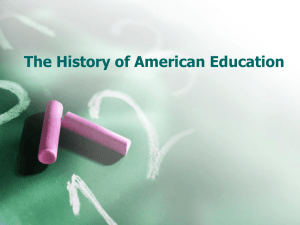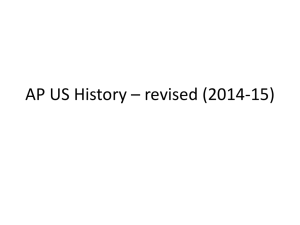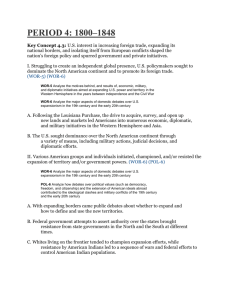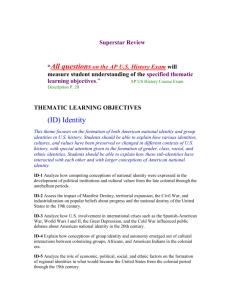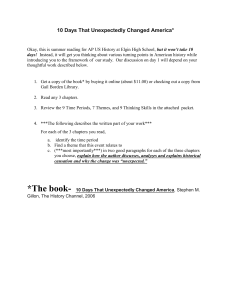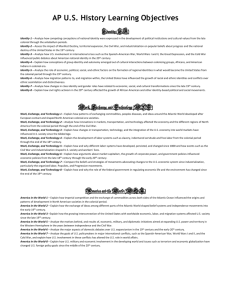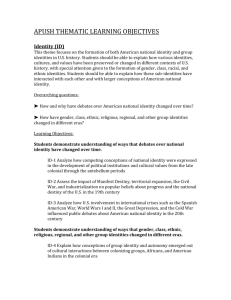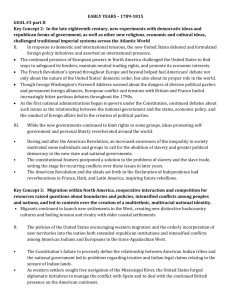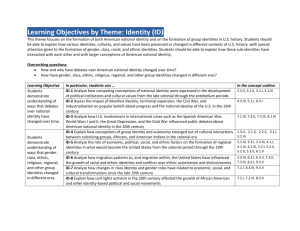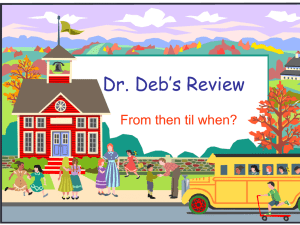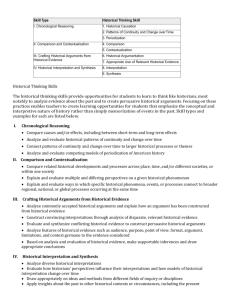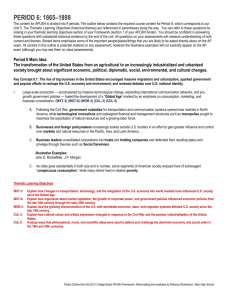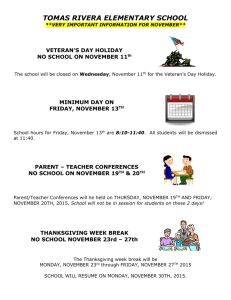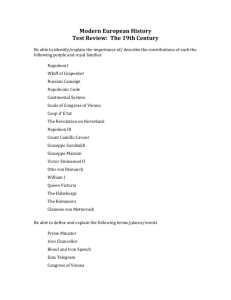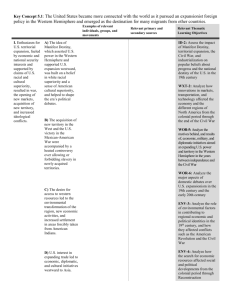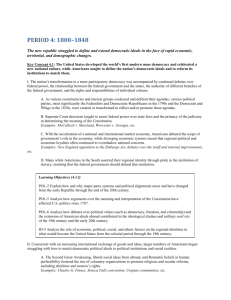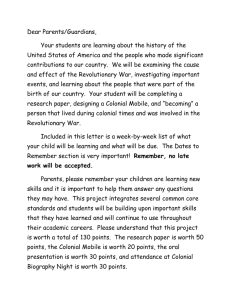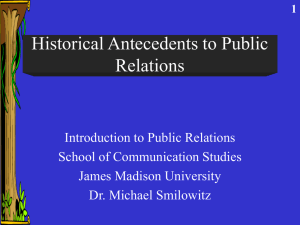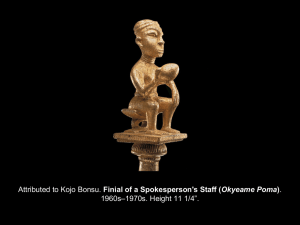File - Ms. Stern US History APUSH World History WORLD
advertisement
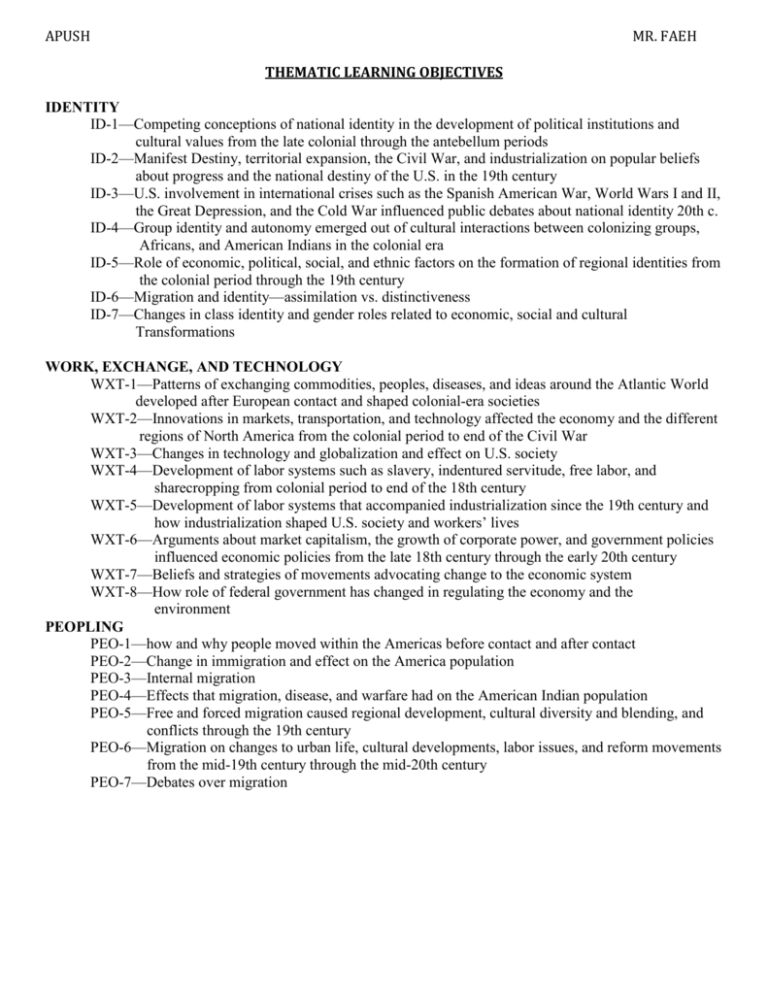
APUSH MR. FAEH THEMATIC LEARNING OBJECTIVES IDENTITY ID-1—Competing conceptions of national identity in the development of political institutions and cultural values from the late colonial through the antebellum periods ID-2—Manifest Destiny, territorial expansion, the Civil War, and industrialization on popular beliefs about progress and the national destiny of the U.S. in the 19th century ID-3—U.S. involvement in international crises such as the Spanish American War, World Wars I and II, the Great Depression, and the Cold War influenced public debates about national identity 20th c. ID-4—Group identity and autonomy emerged out of cultural interactions between colonizing groups, Africans, and American Indians in the colonial era ID-5—Role of economic, political, social, and ethnic factors on the formation of regional identities from the colonial period through the 19th century ID-6—Migration and identity—assimilation vs. distinctiveness ID-7—Changes in class identity and gender roles related to economic, social and cultural Transformations WORK, EXCHANGE, AND TECHNOLOGY WXT-1—Patterns of exchanging commodities, peoples, diseases, and ideas around the Atlantic World developed after European contact and shaped colonial-era societies WXT-2—Innovations in markets, transportation, and technology affected the economy and the different regions of North America from the colonial period to end of the Civil War WXT-3—Changes in technology and globalization and effect on U.S. society WXT-4—Development of labor systems such as slavery, indentured servitude, free labor, and sharecropping from colonial period to end of the 18th century WXT-5—Development of labor systems that accompanied industrialization since the 19th century and how industrialization shaped U.S. society and workers’ lives WXT-6—Arguments about market capitalism, the growth of corporate power, and government policies influenced economic policies from the late 18th century through the early 20th century WXT-7—Beliefs and strategies of movements advocating change to the economic system WXT-8—How role of federal government has changed in regulating the economy and the environment PEOPLING PEO-1—how and why people moved within the Americas before contact and after contact PEO-2—Change in immigration and effect on the America population PEO-3—Internal migration PEO-4—Effects that migration, disease, and warfare had on the American Indian population PEO-5—Free and forced migration caused regional development, cultural diversity and blending, and conflicts through the 19th century PEO-6—Migration on changes to urban life, cultural developments, labor issues, and reform movements from the mid-19th century through the mid-20th century PEO-7—Debates over migration APUSH MR. FAEH POLITICS AND POWER POL-1— Analyze the factors behind competition, cooperation, and conflict among different societies and social groups in North America during the colonial period POL-2— Explain how and why major party systems and political alignments arose and have changed from the early Republic through the end of the 20th century POL-3— Explain how activist groups and reform movements have caused changes to state & society POL-4— Analyze how and why the New Deal, the Great Society, and the modern conservative movement all sought to change the federal government’s role in U.S. political, social, and economic life POL-5— Analyze how arguments over the Constitution have affected U.S. politics since 1787 POL-6— Analyze how debates over political values (such as democracy, freedom, and citizenship) and the extension of American ideals abroad contributed to the ideological clashes and military conflicts of the 19th & early 20th c. POL-7—Debates over civil rights and civil liberties AMERICA IN THE WORLD WOR-1—imperial competition & exchange of commodities across Atlantic influenced the origins and patterns of development of North American societies in the colonial period WOR-2— Explain how the exchange of ideas among different parts of the Atlantic World shaped belief systems and independence movements into the early 19th century WOR-3—Effect of globalization on American society since late 19th century WOR-4— Explain how the U.S. involvement in global conflicts in the 20th century set the stage for domestic social changes WOR-5— Causes & results of expansion in the years between independence and the Civil War WOR-6—Aspects of debates over U.S. expansionism in the 19th century and the early 20th century WOR-7—Goals of US in major international conflicts and role in world affairs WOR-8—Effect of terrorism and globalization on foreign policy goals ENVIRONMENT AND GEOGRAPHY ENV-1—Columbian Exchange altered the natural environment of North America and affects on groups ENV-2—how the natural environment contributed to the development of distinct regional groups ENV-3— role of environmental factors in contributing to regional economic and political identities in the 19th c, and affected conflicts such as the American Revolution and the Civil War ENV-4— search for economic resources affected developments from colonial period- Reconstruction ENV-5—Debates about natural resources and the environment IDEAS, BELIEFS, AND CULTURE CUL-1— Compare the cultural values and attitudes of different European, African American, and native peoples in the colonial period and explain how contact affected relationships and conflicts CUL-2— Analyze how emerging conceptions of national identity and democratic ideals shaped value systems, gender roles, and cultural movements in the late 18th century and the 19th century CUL-3— Explain how cultural values and artistic expression changed in response to the Civil War and the postwar industrialization of the United States CUL-4— Analyze how changing religious ideals, Enlightenment beliefs, and republican thought shaped the politics, culture, and society of the colonial era through the early Republic CUL-5— Analyze ways that philosophical, moral, and scientific ideas were used to defend and challenge the dominant economic and social order in the 19th and 20th centuries CUL-6—Role of culture & arts in 19th- and 20th-century movements for social and political change CUL-7—Effect of cultural values and popular culture on American society
